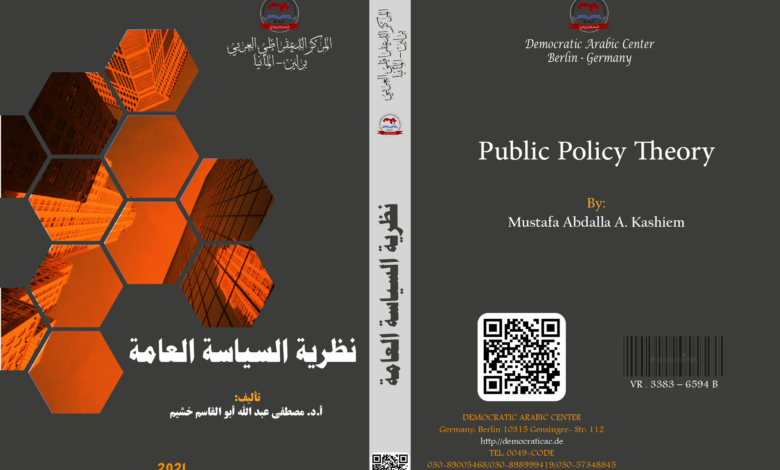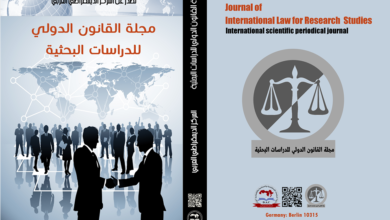
تأليف : أ.د. مصطفى عبد الله أبو القاسم خشيم
نسخة “pdf”- نظرية السياسة العامة
الطبعة الأولى “2021″ –من كتاب: – نظرية السياسة العامة
جميع حقوق الطبع محفوظة #المركز_الديمقراطي_العربي ولا يسمح بإعادة إصدار هذا الكتاب أو اي جزء منه أو تخزينه في نطاق إستعادة المعلومات أو نقله بأي شكل من الأشكال، دون إذن مسبق خطي من الناشر .
تقديم:
إن المتتبع لأدبيات السياسة العامة يلاحظ أن تطور نظرية متكاملة ومستقلة في هذا السياق قد مر بمراحل مخاض طويلة نتج عنها وجود أطر نظرية مختلفة تصف وتحلل وتتنبأ بعملية اتخاذ القرارات. ووفقا لفلسفة توماس كون عن الثورة العلمية، يلاحظ وجود ثلاثة ثورات متتالية في مجال دراسة السياسة العامة، وهي: الثورة الكلاسيكية التي يعود إليها الفضل في تأسيس ما يعرف العلوم السيايسة، والثورة السلوكية التي يعود إليها الفضل في بروز علم السياسة المستقل، والثورة المابعدية التي أسهمت بدورها في تطوير نظرية متكاملة ومستقلة للسياسة العامة. لكن تطوير نظرية متكاملة للسياسة العامة في إطار المدرسة المابعدية لا يعني بأي حال من الأحوال عدم الاستفادة من مساهمات النظريتين الكلاسيكية والسلوكية في هذا المجال، وعليه يلاحظ أن نظرية دائرة السياسة العامة المابعدية تعتبر مستوفية لشروط النظرية من حيث: الوصف، والتحليل، والتبوء وهي سمات عجزت الأطر النظرية السابقة على تحقيقها مجتمعة.
ولا تقتصر أهداف هذا الكتاب على استعراض أدبيات السياسة العامة منذ ازدهار الحضارات القديمة، ولكنها تمتد لتشمل تطبيق مفهوم الثورة العلمية الذي طوره توماس كون في الستينيات من القرن العشرين ، حيث يتضح وجود ثلاثة أطر نظرية مختلفة للسياسة العامة وهي:
- نظرية كلاسيكية تتعامل مع السياسة العامة كنتيجة أو متغير تابع.
- ونظرية سلوكية تتعامل مع السياسة العامة كسبب أو متغير مستقل.
- ونظرية ما بعدية تعتبر السياسة العامة عملية معقدة لها مراحل متعددة ومتداخلة، وبالتالي فإنها قد تكون سببا ونتيجة في نفس الوقت.
كما يهدف هذا الكتاب إلي التعرض للبعد العملي أو التطبيقي للسياسة العامة، حيث سيتم التركيز على تنفيذ ونتائج السياسة العامة على عدة مستويات ومراحل. فالسياسة العامة ليست مجرد بارادايم يجسد وجود نظريات ونماذج وأطر نظرية كلاسيكية أو سلوكية وما بعدية، ولكنها تعتبر أيضا مجال يتم فيه دراسة سياسات عامة على أرض الواقع، مثل السياسة العامة للتعليم.
عليه، يلاحظ أن فصول الكتاب الأربعة تصف وتحلل وتتنبأ بالسياسة العامة من خلال الأبعاد التالية:
أولا، تحديد مفهوم وأبعاد السياسة العامة منذ أقدم الحضارات البشرية تمشيا مع مقولة أن السياسة العامة لا تنبع من فراغ، حيث يركز الفصل الأول من هذا الكتاب على تتبع مفهوم وأبعاد السياسة العامة منذ القدم.
ثانيا، تتبع المفهوم التقليدي لعملية صنع القرارات منذ أن نشر وودرو ولسون مقالته الشهيرة عن بروز علم الادارة العامة عام 1887، وهو مفهوم يجسد الأخذ بمبدأ الفصل بين السلطات في المطلق. عليه، فمفهوم السياسة العامة التقليدي يتعامل مع السياسة العامة كنتيجة تتمثل في سلطة تشريعية تصنع السياسة العامة وسلطة تنفيذية تطبق ذلك.
ثالثا، قيام الثورة السلوكية في منتصف القرن العشرين وأخذها في الحسبان توسع اختصاصات النظم السياسية المعاصرة في أوجه الحياة المختلفة، الأمر نتج عنه تطوير نظرية جديدة تتعامل مع السياسة العامة كمخرجات أو متغير مستقل.
رابعا، قيام الثورة المابعدية في نهاية عقد الستينيات من القرن الماضي وتطوير نظريات ما بعدية تتعامل مع السياسة العامة كسبب ونتيجة في نفس الوقت من ناحية، وتعكس خصوصية نظرية السياسة العامة من حيث الاستقلالية وتضييق الفجوة بين النظرية والتطبيق من ناحية أخرى.
يتضح مما سبق، أن نظرية السياسة العامة المعاصرة تتسم بالتعقيد والتداخل والاستقلالية والبعد التراكمي للمعرفة البشرية. فمفهوم السياسة العامة يتسم بالتعقيد والتداخل ، نظرا لتفاوت التعامل معها كنتيجة أو سبب أو عملية من ناحية، ونظرا لأنها تعتبر مجال يتداخل مع بقية فروع المعرفة الأخرى من ناحية أخرى. كما أن السياسة العامة أصبحت علما مستقلا يدرس كتخصص فرعي في اقسام علم السياسة أو في اقسام علمية متخصصة من ناحية، ويعكس بعدا تاريخيا يعود إلي اقدم الحضارات البشرية من ناحية أخرى.
Mustafa Abdalla A. Kashiem
Abstract
A review of the literature reveals that the development of an integrated and independent public policy theory in this context has gone through long historical processes, resulting in different theoretical frameworks that describe, analyze and predict the decision-making process from different perspectives.
According to Thomas Kuhn’s philosophy on the scientific revolutions, there are three successive revolutions in public policy studies, namely, the classical paradigm, which developed political sciences, the behavioral school of thoughts, which established political science as an independent field of knowledge, and the post-behavioral revolution, which contributed to the development of an integrated and independent theory of public policy.
Nevertheless, the development of an integrated theory of public policy in the early 1970s does not mean in any way not to benefit from the contributions of the classical and behavioral theory in this field; therefore, it may argue that the theoretical framework of public policy circle is descrying, analyzing, and predicting public policy processes. Yet, classical and behavioral theories failed in this regard to do so due to their micro and macro focus on decision-making and public policy.
The aim of this book is not limited to reviewing the literature of public policy, but it extends to describing and analyzing the concept of the scientific revolution developed by Thomas Kuhn within the field of public policy. Accordingly, three theoretical frameworks may identify regarding public policy theoretical framework:
- A classic theory deals with public policy as a result or dependent variable.
- A behavioral theory focuses on public policy as an output or independent variable.
- A post-behavioral public policy theory identifies policy as a process or a dependent and independent variable.
This book also aims to expose the practical dimension of public policy, e.g., public policy circles in the real world. Public policy is not just a paradigm that embodies the existence of classical, behavioral, and post- behavioral theories, models, and theoretical frameworks. It is also considering a field in which public policy may study in the real world, such as public policy for education. Accordingly, this book contains four chapters that describe, analyze and predict public policy through the following dimensions:
First, chapter one identifies the concept and dimensions of public policy since the oldest human civilizations. Here, it may argue that public policy does not exist from a vacuum. Thus, the first chapter of this book focuses on tracing the concepts and dimensions of public policy since ancient civilization.
Second, chapter two traces the traditional concept of decision-making since Woodrow Wilson published his famous essay on the emergence of the science of public administration in 1887. Wilson’s view was affected by the principle of separation of powers in the absolute term. Therefore, the traditional theory of public policy argued that public policy has dominated by a legislative authority on the one hand and an executive branch authorized to execute them on the other hand.
Third, the emergence of the behavioral paradigm in the 1950s is the concern of chapter three. The behavioral public policy theory took into account the expanded activities of political systems in various aspects of life. Yet, the behavioral public policy theory rejects the proposition of classical theory on public policy as a result on the one side, and it deals with public policy as an outcome or an independent variable on the other side.
Fourth, the final chapter of this book describes and analyzes neo-theoretical frameworks that deal with public policy as a process. The behavioral theory of public policy is distinctive, independent, and narrowing the gap between theory and practice.
It is clear from the previous argument that the contemporary public policy theory may describe as complex, overlap, independent, and a cumulative dimension of human knowledge. In short, the concept of public policy is a complex, overlaps process due to its nature as a multi-dimensional process, e.g., dealing with it as a result, and cause on the one hand and as processes on the other hand. Furthermore, it is also considering a field that overlaps with other branches of knowledge. Yet, public policy has also become an independent field sonce the 1970s. Thus, either it has been taught as a sub-field in political science departments or separate scientific departments on the one hand, or it reflects a historical dimension that goes back to the ancient human civilizations on the other hand.
الناشر: المركز الديمقراطي العربي للدراسات الإستراتيجية والسياسية والاقتصادية





